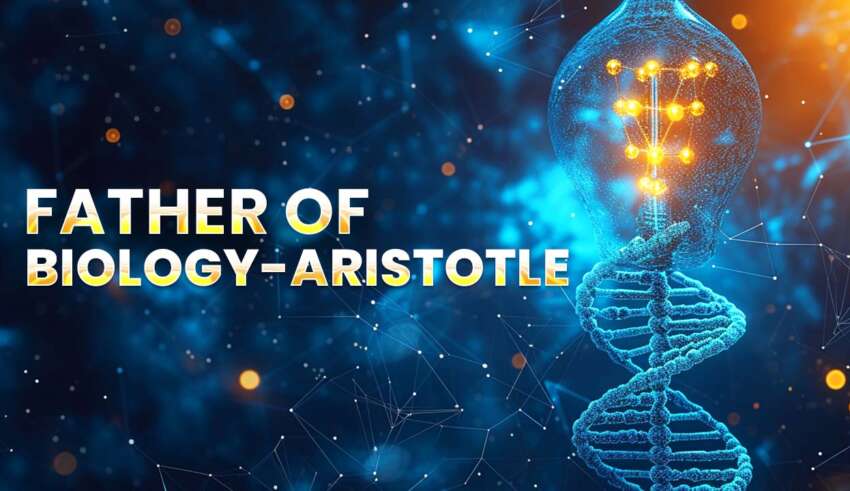
Father of Biology – Aristotle
Biology, the study of how living things interact with their surroundings, is a key part of natural science. It spans from the smallest cells to the diverse life across ecosystems. People often ask who the Father of Biology is, and Aristotle, an ancient Greek philosopher, is credited with this title. Aristotle, who lived from 384 to 322 BC, made important contributions to biology by studying and classifying different types of life, like animals, plants, and tiny organisms. His ideas formed the early basis for understanding life and its processes, shaping the beginning of biological science.
This article dives into Aristotle, known as the Father of Biology, highlighting his achievements, works, discoveries, and his influence on different branches of biology.
Who is the Father of Biology?
Born in 384 BC, Aristotle is widely known as the Father of Biology. He visited Lesvos in the fourth century BC, a time (race against time phrase meaning) when the island was abundant with life. His fascination with what he saw there sparked the beginnings of what we now call biology. Aristotle’s deep exploration of the natural world, based on careful observation and scientific principles rather than beliefs in the supernatural, earned him the title of the Father of Biology. His early understanding of how animals relate to each other and his creation of a classification system further underline his major contributions to this field.
Father of Biology: Works
Aristotle, often recognized as the Father of Biology, wrote approximately 200 works spanning philosophy and science. None of these texts exist in complete form today. Ancient scholars, including Andronicus of Rhodes, edited his lecture notes and draft manuscripts. Around 60 BCE in Rome, Andronicus meticulously organized and published Aristotle’s works. Despite their dense style, these papers remain challenging for philosophers to decipher. Nevertheless, they serve as invaluable sources through which Aristotle’s influential ideas have endured across centuries.
He was a brilliant writer; among his best-known works are the Organon, De Anima (On the Soul), Physics, Metaphysics, Nicomachean Ethics, Eudemian Ethics, Magna Moralia, Politics, Rhetoric, and Poetics. Aristotle, widely hailed as the Father of Biology, also authored various works on natural history and science, showcasing his diverse intellectual pursuits and lasting influence on these fields.
Read More:
- Everything you must know about the History of Mathematics
- Most Famous Indian Mathematicians and Their Contributions
- List of Great Indian Scientists who changed the World by their Contributions
Father of Biology: Major Discoveries
Aristotle, known as the Father of Biology, made remarkable discoveries in both science and philosophy. Here’s a brief summary of his achievements:
- Aristotle carefully studied the anatomy of octopuses, cuttlefish, crabs, and many other sea creatures by dissecting them.
- He examined how chicks develop before hatching, distinguished whales and dolphins from fish, studied how bees organize themselves socially, and explored the stomachs of animals like cows to understand their digestion. He also noted that some sharks give birth to live young.
- Aristotle grouped animals into categories based on their similarities. He started with broad groups called genera and then identified different species within each group.
- Aristotle classified animals into two main groups: those with blood (like vertebrates such as reptiles, birds, fish, mammals, and mistakenly whales as fish) and those without (like invertebrates such as insects, spiders, scorpions, centipedes, shelled animals like echinoderms, and cnidarians which he called zoophytes).
Father of Biology Highlights
Here are the key details about Aristotle, considered the Father of Biology, presented in a table format.
| Particulars | Details |
| Date of Birth | 384 BC Srafira Chaladice Geek |
| Died | 322 BC, Euboea, Geek |
| Education | Platonic Academy |
| Spouse | Pythias |
| Notable work | Corpus Aristotlicum |
| Nationality | Greek |
| Region | Western Philosophy |
| Era | Ancient Greek Philosophy |
| School | Peripatetic School Classical Republicanism Aristotelianism School |
| Notable Students | Alexander the great, Theophrastus, Aristoxenus |
| Main Interest | Zoology, Biology, Physics, Psychology, Logics, Ethics, Poetry, Music, Metaphysics, Rhetoric, Aesthetics, Economics, Politics, Geology, Government, Meteorology |
Father of Biology: Father of Branches of Biology
Here is a table that lists the founders of various branches of biology.
| Subject | Father of Branches |
| Father of Botany | Theophrastus |
| Father of Zoology | Aristotle |
| Father of Biology | Aristotle |
| Father of Modern Botany | Linnaeus |
| Father of Endocrinology | Thomas Addison |
| Father of Immunology | Edward Jenner |
| Father of Agronomy | Pietro de’Crescenzi |
| Father of Genetics | GJ Mendel |
| Father of Modern Genetics | TH Morgan |
| Father of Cytology | Robert Hooke |
| Father of Palynology | Erdtman |
| Father of Mycology | Micheli |
| Father of Plant Physiology | Stephan Hales |
| Father of Gene Therapy | Anderson |
| Father of Polygenic Inheritance | Joseph Gottlieb Koleuter |
| Father of Surgery and Plastic Surgery | Sushruta |
| Father of Anatomy | Herophilus |
| Father of Ethology | Konrad Lorenz |
| Father of Cloning | Ian Wilmut |
| Father of Chemotherapy | Paul Ehrlich |
| Father of Bryology | Johann Hedwig |
| Father of Mutation | Hugo De Vries |
| Father of Genetic Engineering | Paul Berg |
| Father of Ayurveda | Charka |
| Father of Taxonomy | Carolus Linnaeus |
| Father of Embryology | Aristotle |
| Father of Blood Circulation | William Harvey |
| Father of Medicine | Hippocrates |
| Father of Blood Groups | Karl Landsteiner |
| Father of Paleontology | Leonardo da Vinci |
| Father of DNA Finger Printing | Garrod |
| Father of Gerontology | V. Korenchevsk |
| Father of Bacteriology | Robert Koch |
| Father of Antibiotics | Alexander Fleming |
| Father of Pathology | Rudolph Virchow |
| Father of Virology | WM Stanley |
| Father of Epidemiology | John Snow |
| Father of Endocrinology | Thomas Addison |
| Father of Homeopathy | Hahnemann |
Father of Biology in India
The “Father of Biology in India” is a title often associated with Sir Jagadish Chandra Bose. He was a prominent Indian scientist known for his ground-breaking contributions to various fields of science, especially biology and botany. Bose’s pioneering experiments highlighted the similarities between plant and animal tissues, laying a strong foundation for biophysics and plant biology in India. While he shares credit with others in the development of biology, Bose stands out as a key figure in its history, shaping scientific thought and research in the country.
Summary – Father of Biology
Aristotle, born in 384 BC, is widely recognized as the Father of Biology for his ground-breaking contributions to the study of living organisms. As a Greek philosopher, Aristotle meticulously explored the natural world through careful observations and scientific theories, establishing himself as the Father of Biology. His fascination with the diversity of life on the island of Lesvos sparked the emergence of biology. Aristotle’s key discoveries, such as his precise studies of marine invertebrates and the embryological development of chicks, highlight his pioneering approach. He also established classifications based on whether animals have blood, distinguishing between vertebrates and invertebrates. Although his works can be challenging to decipher, they laid a solid foundation for the study of biology. Aristotle’s enduring influence across various disciplines underscores his enduring legacy as a pivotal figure in the history of biology.
FAQs on Father of Biology
Q1. Who is regarded as the Father of Biology?
Ans. The Father of Biology is regarded to be Aristotle. He is recognized as the founding figure of biology. Aristotle categorized animals and plants as the first two kingdoms. The term Aristotle’s Biology refers to his theory explaining metabolism, temperature control, and embryogenesis.
Q2. What are the Three Main Ideas of the Father of Biology (Aristotle)?
Ans. Father of Biology, Aristotle, identified three fundamental concepts long ago: ethos, pathos, and logos. Ethos refers to our credibility and why others should take (take with a grain of salt idiom synonym) us seriously when we speak.
Q3. What is the Father of Biology (Aristotle) best known for?
Ans. Aristotle, the Father of Biology, is celebrated in Greek philosophy for his significant contributions to a wide array of fields, including logic, rhetoric, physics, biology, psychology, mathematics, metaphysics, ethics, and politics. He was a student of Plato for twenty years but gained renowned for challenging Plato’s theory of forms.
Q4. Why is Aristotle known as the Father of Biology?
Ans. Aristotle is called the Father of Biology because he extensively studied the natural world and its origins through scientific theories and careful observations, instead of attributing phenomena to supernatural causes.
Q5. Who is often referred to as the “Father of Biology in India”?
Ans: Sir Jagadish Chandra Bose is often attributed to this title.
Q6. What is the Father of Biology Aristotle’s Theory of Forms?
Ans. For Aristotle, forms are always an expression of something. The only way to understand things is as mixtures of matter and form. In other words, as the Father of Biology, he disagreed with Plato’s assertion that the forms are independent, which is why he was so critical of it.
Q7. How did Aristotle, who is often called the father of biology, impact modern biology?
Ans. Aristotle, known as the father of biology, had a huge impact on modern biology. His organized way of grouping living things and focus on careful observation set the groundwork for biological research. Aristotle was one of the first to categorize animals and study how they grow, ideas that are still crucial in biology today. His books, especially “Historia Animalium,” influenced biology for centuries. This legacy established Aristotle as the father of biology and shaped how we study and understand life today.













